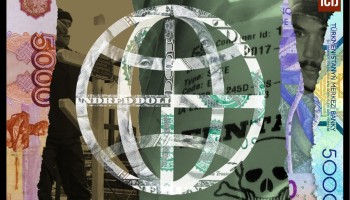The Anti-Corruption Foundation, FBK, Navalny and his allies have to pay the sum to the catering company Moscow Pupil, owned by Russian restaurants and catering businessman, Yevgeny Prigozhin, known also as “Putin’s chef” because he has often been in charge of organizing Vladimir Putin’s dinners with foreign dignitaries.
Prigozhin is also known as the one who ran the infamous St. Petersburg “troll farm” and other pro-Putin media operations. One of his operatives came clean to reporters, sharing some of the alleged dirty work he and his team did for the oligarch — including murder, as the OCCRP wrote last year.
Prigozhin reportedly sued FBK and asked for 1.5 billion rubles ($23.5 million) in compensation after Navalny’s organization published a video blaming Prigozhin's company for last December’s food poisoning.
At the same time, as FBK said in its investigative story in February this year, Russia’s Investigative Committee tried to cover up the responsibility of Prigozhin’s company, indicating that another supplier - VITO-1, was responsible for the poisoning.
Moscow Pupil, according to VOA, blamed FBK for losing a major supply contract because of Navalny’s video.
Besides ordering the FBK to pay a fine, the court also ordered the organization to delete the video.
“So, they poisoned children in schools and kindergartens. Cases of dysentery have been documented. However, we should pay,” Navalny tweeted.
He also commented that the court's decision in favor of “Putin’s chef” is part of a campaign “to strangle FBK in the interest of the chief bureaucrat - Putin.”
Earlier this month, masked police raided the offices and the homes of employees of Navalny’s FBK, and froze the NGO’s bank accounts, saying they found proof that the organization was financed from abroad and that it laundered the money.
The simultaneous raids at 30 locations throughout Russia came less than a week after the Ministry of Justice declared the Anti-Corruption Foundation (FBK) a “foreign agent,” forcing the anti-graft group to disclose its donors and objectives.
In August, Russian authorities have begun investigating FBK on suspicion of laundering one billion rubles (US$15.3 million), as the Investigative Committee said in a statement at the time.
All those activities, according to The Moscow Times, come as part of a coordinated campaign aimed at crippling the Kremlin’s critics activities following a spate of big political demonstrations, although Russian authorities deny those claims.






